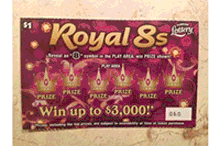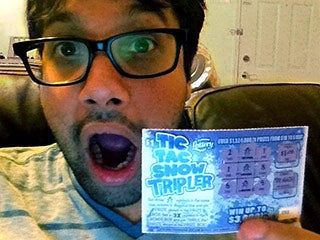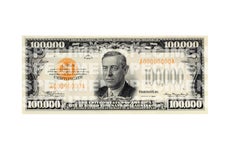Win big by playing scratch-offs?
The Bankrate promise
At Bankrate we strive to help you make smarter financial decisions. While we adhere to strict , this post may contain references to products from our partners. Here's an explanation for .
Upon reading this headline, you probably thought my experiment was doomed to fail. You clicked anyway. I also thought the experiment would be a dumb waste of money. I did it anyway.
 What made you click this article and what made me buy a Florida Lottery $1 scratch-off ticket every day for one month (Dec. 3, 2013 to Jan. 3, 2014) is likely the same reason: hope. That’s where they get you.
What made you click this article and what made me buy a Florida Lottery $1 scratch-off ticket every day for one month (Dec. 3, 2013 to Jan. 3, 2014) is likely the same reason: hope. That’s where they get you.
I wanted pretty badly to write an article with the headline, “How one article ensured I’d never need to write again” or “5 things I wish I’d known before buying a Lamborghini,” so I went through with it. Because hope. And yes, I’m aware that had I won the grand prize for $1 scratch-offs (up to $5,000, as far as I saw) every day of the experiment, I still probably couldn’t afford either of those headlines.
Why people play
I am by no means a gambler. Prior to this experiment, my exposure to the lottery consisted of tickets I asked my mom to buy me as a kid and sheets of scratch-offs received as gifts for holidays. I’ve spent a lifetime total of $5 at a casino, all spent and lost upon the day I could legally gamble. I have no investments (though I plan to make some, y’know, eventually). This experiment has reinforced my determination to maintain my relatively risk-free lifestyle.
However, there were moments throughout the month when I understood why people play these games so often, adding up to $5 billion in Florida Lottery ticket sales during the 2012-2013 fiscal year alone.
 Early on, I won a whopping $10 playing Tic Tac Snow Tripler. After 10 days, during which I’d only won $1, this put me ahead $2 in terms of spending versus winning. It gave me hope that maybe I’d be ahead at the end of the month. It helped me empathize with people who win comparable prizes playing the lotto, driving them to continue playing in the hopes that it’ll all be worth it eventually.
Early on, I won a whopping $10 playing Tic Tac Snow Tripler. After 10 days, during which I’d only won $1, this put me ahead $2 in terms of spending versus winning. It gave me hope that maybe I’d be ahead at the end of the month. It helped me empathize with people who win comparable prizes playing the lotto, driving them to continue playing in the hopes that it’ll all be worth it eventually.
The results, and what I could have done better
After 32 days and 32 lottery tickets, I was $15 in the red. I had to wonder, was there anything I could have done to increase my chances of success? Who better to answer that question than seven-time Florida Lottery grand-prize winner Richard Lustig.
“First of all, the biggest mistake you made was playing different games,” says Lustig. “The best way to increase your chances of winning is to buy at least 10 tickets in a row of the same game. So buying one ticket a day didn’t really help you a lot.” Wish I’d interviewed him before I conducted my experiment.
Here’s me scratching off the last ticket, which was also a winner:
According to Lustig, the best way I could’ve played would have been to buy all 32 tickets at once from the same roll of scratch-offs.
“Almost every time you do that, you’ll have a winning ticket in there. Most of the time, two, and sometimes even three or four,” Lustig says.
While it’s tough to be skeptical in the face of Lustig’s obvious success and infectious enthusiasm, I still wanted to know why, exactly, Lustig’s method works, so I reached out to Jane Harvill, associate professor of statistics at Baylor University in Waco, Texas.
“You increase your chances by reducing the number of losers,” says Harvill.
Each batch of tickets has a certain number of winning tickets in order to comply with the odds printed on the tickets themselves, Harvill says.
“Every time you get a losing ticket, you reduce your chances of losing by one ticket,” Harvill says.
And, considering each batch has considerably more losers than winners, each time I bought a new ticket from a different batch, my pool of possible losing tickets to choose from increased in incredibly larger increments than my pool of possible winners, she says.
So Lustig was right. The stats and what I assume is a swimming pool filled with cash can vouch for his method. But don’t let his success and others’ blind you, says Harvill.
“The house wins. If the house didn’t win, gambling wouldn’t be a huge industry,” Harvill says.
Sure, your odds increase a bit with Lustig’s method, but remember that a slight increase in odds is not synonymous with a loophole; you’re still much more likely to not get a prize at all when you play. There’s a reason why after more than two decades of playing, he’s only “seven-time lottery grand-prize winner Richard Lustig” and not “monthly lottery-winning cash warlock Richard Lustig.”
On the other hand, you have to play to win, and I can’t stop you from trying. But before you go spend your kid’s tuition in hopes of tripling it, remember to “only play what you can afford to play,” Lustig says. “One of the things I preach all the time to people is to set a budget.”
As for me, while I could probably afford to spend a few dollars here and there playing the lotto, I’m pretty sure my hope reserves have dried up more or less forever.
Experiment statistics |
|
|---|---|
| Tickets played | 32 |
| Wins | 7 |
| Losses | 25 |
| Money won total | $17.00 |
| Money spent total | $32.00 |
| My win ratio | 1:4.57 |
| My loss ratio | 1:1.28 |
| Largest prize | $10 |
| Odds of getting that prize | 1:300 |
| Longest winning streak | 1 |
| Longest losing streak | 6 |
| Best odds | 1:4.77 |
| Worst odds | 1:4.97 |
| Average odds | 1:4.85 |
| Most frequent odds | 1:4.77 |
| Median odds | 1:4.87 |
| Number of bonuses | 0 |
| Types of tickets | 8 |
| Most frequently played card | Tic Tac Snow Tripler (11 times) |
Have you ever won the lottery? Do you think you’ve come out ahead overall?
Related Articles



